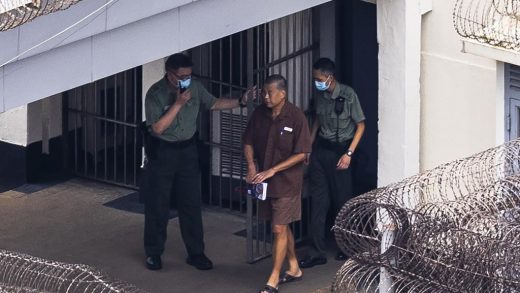
WELLINGTON, New Zealand (AP) — King Charles III told a summit of Commonwealth countries in Samoa Friday that the past could not be changed as he indirectly acknowledged calls from some of Britain’s former colonies for a reckoning over its role in the trans-Atlantic slave trade.
The British royal understood “the most painful aspects of our past continue to resonate,” he told leaders in Apia. But Charles stopped short of mentioning financial reparations that some leaders at the event have urged and instead exhorted them to find the “right language” and an understanding of history “to guide us towards making the right choices in future where inequality exists.”
“None of us can change the past but we can commit with all our hearts to learning its lessons and to finding creative ways to write the inequalities that endure,” said Charles, who is attending his first Commonwealth Heads of Government Meeting, or CHOGM, as Britain’s head of state.

His remarks at the summit’s official opening ceremony echoed comments a day earlier by British Prime Minister Keir Starmer that the meeting should avoid becoming mired in the past and “very, very long endless discussions about reparations.” The U.K. leader dismissed calls from Caribbean countries for leaders at the biennial event to explicitly discuss redress for Britain’s role in the slave trade and mention the matter in its final joint statement.
But Britain’s handling of its involvement in the trans-Atlantic slave trade is seen by many observers as a litmus test for the Commonwealth’s adaptation to a modern-day world, as other European nations and some British institutions have started to own up to their role in the trade.
“I think the time has come for this to be taken seriously,” said Jacqueline McKenzie, a partner at London law firm Leigh Day. “Nobody expects people to pay every single penny for what happened. But I think there needs to be negotiations.”
Such a policy would be costly and divisive at home, McKenzie said.
The U.K. has never formally apologized for its role in the trade, in which millions of African citizens were kidnapped and transported to plantations in the Caribbean and Americas over several centuries, enriching many individuals and companies. Studies estimate Britain would owe between hundreds of millions and trillions of dollars in compensation to descendants of slaves.
The Bahamas Prime Minister Philip Davis on Thursday said he wanted a “frank” discussion with Starmer about the matter and would seek mention of the reparations issue in the leaders’ final statement at the event. All three candidates to be the next Commonwealth Secretary-General — from Gambia, Ghana and Lesotho — have endorsed policies of reparatory justice for slavery.
Starmer said Thursday in remarks to reporters that the matter would not be on the summit’s agenda. But Commonwealth Secretary-General Patricia Scotland told The Associated Press in an interview that leaders “will speak about absolutely anything they want to speak about” at an all-day private meeting scheduled for Saturday.
King Charles said in Friday’s speech that nothing would right inequality “more decisively than to champion the principle that our Commonwealth is one of genuine opportunity for all.” The monarch urged leaders to “choose within our Commonwealth family the language of community and respect, and reject the language of division.”
He has expressed “sorrow” over slavery at a CHOGM summit before, in 2022, and last year endorsed a probe into the monarchy’s ties to the industry.
Charles — who is battling cancer — and his wife, Queen Camilla, will return to Britain tomorrow after visiting Samoa and Australia — where his presence prompted a lawmaker’s protest over his country’s colonial legacy.
He acknowledged Friday that the Commonwealth had mattered “a great deal” his late mother Queen Elizabeth II, who was seen as a unifying figure among the body’s at times disparate and divergent states.
The row over reparations threatened to overshadow a summit that Pacific leaders — and the Commonwealth secretariat — hoped would focus squarely on the ruinous effects of climate change.
“We are well past believing it is a problem for the future since it is already undermining the development we have long fought for,” the king said Friday. “This year alone we have seen terrifying storms in the Caribbean, devastating flooding in East Africa and catastrophic wildfires in Canada. Lives, livelihood and human rights are at-risk across the Commonwealth.”
Charles offered “every encouragement for action with unequivocal determination to arrest rising temperatures” by cutting emissions, building resilience, and conserving and restoring nature on land and at sea, he said.
Samoa is the first Pacific Island nation to host the event, and Prime Minister Fiamē Naomi Mata’afa said in a speech Friday that it was “a great opportunity for all to experience our lived reality, especially with climate change”, which was “the greatest threat to the survival and security of our Pacific people.”
Two dozen small island nations are among CHOGM’s 56 member states, among them the world’s most imperiled by rising seas. Her remarks came as the United Nations released a stark new report warning that the world was on pace for significantly more warming than expected without immediate climate action.
The population of the member nations of the 75-year-old Commonwealth organization totals 2.7 billion people.



